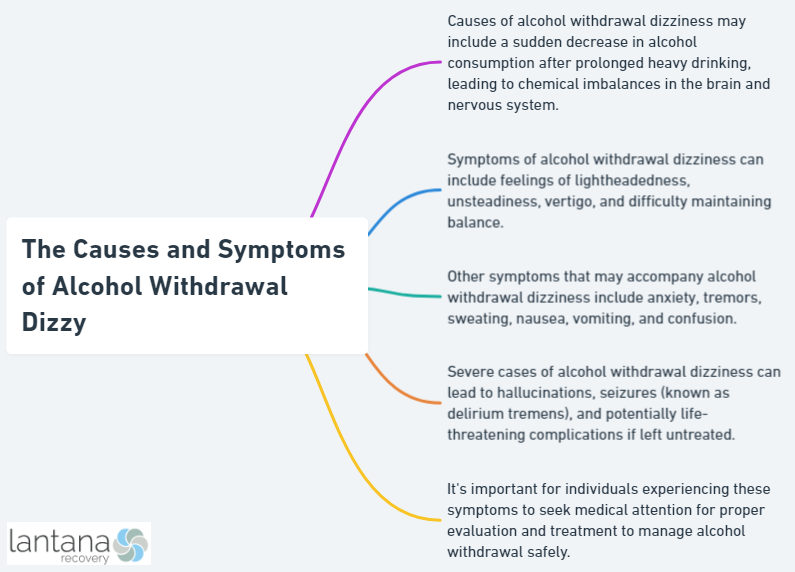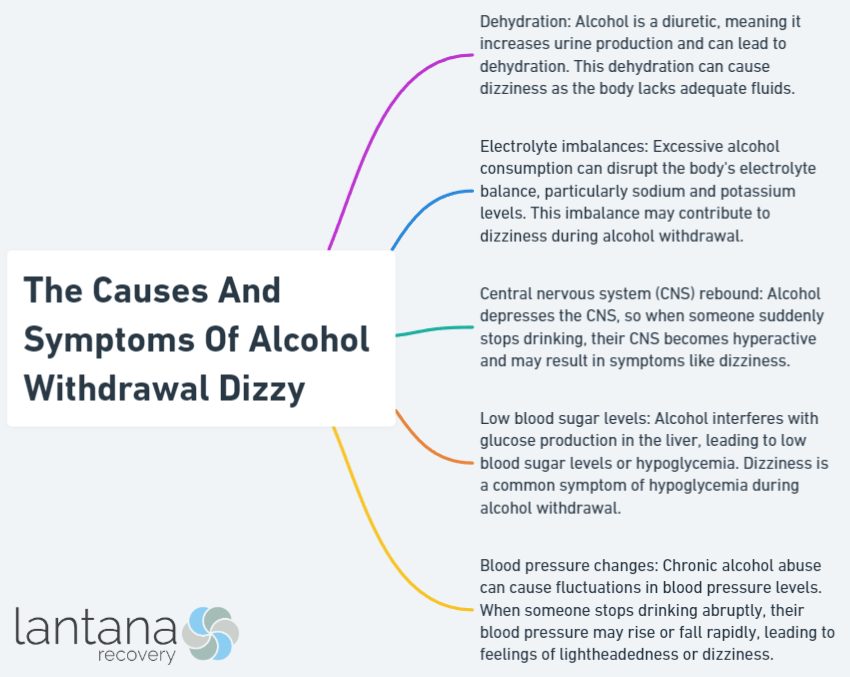Did you know that dizziness and headaches are common symptoms during alcohol withdrawal? Understanding the causes and how to manage these symptoms can be crucial in ensuring a smooth and successful recovery. In this blog post, we delve into the reasons behind alcohol withdrawal dizzy, its connection to headaches, and the various treatment options available to help you through this challenging time. Let’s embark on a journey to better understand alcohol withdrawal and how to conquer these symptoms with confidence.
Key Takeaways
- Alcohol withdrawal can cause dizziness due to changes in blood pressure, neurotransmitter imbalances and dehydration.
- Managing alcohol withdrawal symptoms requires medically assisted detox, outpatient treatment and support groups/counseling.
- Reducing intake gradually while maintaining nutrition & hydration is essential for preventing alcohol withdrawal dizziness & headaches.
Understanding Alcohol Withdrawal Dizziness
Alcohol withdrawal occurs when someone who has been drinking heavily or has an alcohol use disorder stops or reduces their alcohol consumption abruptly. The body and brain must readjust to functioning without alcohol, leading to withdrawal symptoms such as dizziness, which can be attributed to changes in blood pressure, neurotransmitter imbalances, and dehydration.
Symptoms of alcohol withdrawal can range from mild to severe, and can include anxiety, insomnia, and depression.
Blood Pressure Fluctuations
Alcohol withdrawal can result in abrupt fluctuations in blood pressure due to the impact on the central nervous system. When alcohol use is suddenly reduced or stopped, it can lead to experiencing alcohol withdrawal symptoms, including elevated blood pressure. These fluctuations in blood pressure can be responsible for:
- Dizziness as the body adjusts to the absence of alcohol
- Headaches
- Rapid heartbeat
- Sweating
- Anxiety
- Tremors
- Nausea and vomiting
Prolonged periods of alcohol abuse can further exacerbate these fluctuations, increasing the severity of withdrawal symptoms.
Stress hormones released during withdrawal can also contribute to these sudden blood pressure changes, leading to feelings of dizziness and faintness. In order to reduce the severity of dizziness and ensure a safer recovery process, it’s necessary to monitor and manage blood pressure during alcohol withdrawal.

Neurotransmitter Imbalances
Alcohol consumption affects the balance of neurotransmitters in the brain, which are responsible for regulating various functions, including mood, sleep, and brain function. When alcohol is removed from the system, it can lead to overstimulation and hyperexcitability due to neurotransmitter imbalances. These imbalances can cause:
- Dizziness
- Nausea
- Headaches
- Anxiety
- Irritability
- Insomnia
- Sweating
- Tremors
Treatment for alcohol withdrawal often involves the use of medications such as benzodiazepines like diazepam, chlordiazepoxide, and lorazepam, which have been extensively studied for their effectiveness in treating alcohol withdrawal. These medications can help restore balance to the neurotransmitters and alleviate the dangers of withdrawal symptoms, including dizziness.
Dehydration
Another key factor contributing to alcohol withdrawal dizziness is dehydration. Alcohol is a diuretic, meaning it increases urine production and can lead to dehydration. Dehydration can exacerbate dizziness during alcohol withdrawal and contribute to other withdrawal symptoms such as headaches.
Consuming enough water and other fluids is a crucial measure to avoid dehydration during alcohol withdrawal. Staying hydrated can help reduce dizziness and other withdrawal symptoms and promote overall health during the recovery process.
Alcohol Withdrawal Headaches

Headaches are a common symptom of alcohol withdrawal, usually occurring within the first 6 to 24 hours after the cessation of excessive alcohol intake. The duration of alcohol withdrawal headaches varies, but they typically peak by the third day and gradually subside over time.
Understanding the root causes of headaches during alcohol withdrawal and their management strategies can make the recovery process more comfortable.
Causes of Headaches
Several factors contribute to headaches during alcohol withdrawal, including:
- Dehydration: This can lead to headaches due to an imbalance in electrolytes and other bodily fluids caused by the body becoming dehydrated.
- Stress: It can lead to increased tension in the body and increased blood pressure, both of which can result in headaches.
- Alterations in brain chemistry: During alcohol withdrawal, there are changes in the brain’s neurotransmitters, which can trigger headaches.
Changes in brain chemistry can further exacerbate headaches during alcohol withdrawal. Alcohol disrupts the balance of neurotransmitters, potentially leading to headaches as the brain struggles to adjust. Understanding these underlying factors can help in managing withdrawal headaches more effectively.
Wondering if beer causes dependency? Read our article to know more about the symptoms and treatment of beer withdrawal.
Managing Withdrawal Headaches
Managing withdrawal headaches requires addressing their root causes. Here are some strategies to help:
- Maintain hydration and adequate rest to stabilize blood pressure and neurotransmitter levels.
- Consume water and other fluids to stay hydrated.
- Ensure proper nutrition during alcohol withdrawal to reduce the severity of headaches.
By following these strategies, you can help alleviate withdrawal headaches.
In addition to hydration and rest, over-the-counter pain relievers such as ibuprofen and acetaminophen can be used to manage withdrawal headaches. It is essential to consult with a medical professional before using any medication to ensure its safety and effectiveness during the withdrawal process.
Timeline of Alcohol Withdrawal Symptoms

The duration of alcohol withdrawal symptoms may vary. Usually, it spans over a couple of days up to several weeks. Symptoms can range from mild to severe and vary in duration depending on several factors, such as the severity of alcohol dependence, the level of alcohol intake, and the presence of coexisting medical and psychiatric conditions.
We will detail the timeline of alcohol withdrawal symptoms, starting from the early stages to the peak and post-acute withdrawal syndrome (PAWS).
Early Symptoms
The early symptoms of alcohol withdrawal usually manifest within the first few hours after stopping alcohol consumption. These initial indicators include:
- Sleep disruption
- Rapid heartbeat
- Alterations in blood pressure
- Sweating
- Shaking
- Fever
Should these early symptoms worsen or persist, it’s important to monitor them and seek medical attention as they may signal a more severe withdrawal episode which may require medical intervention. In some cases, individuals may experience mild withdrawal symptoms that can be managed without medical assistance.
Peak Symptoms
Peak symptoms of alcohol withdrawal typically occur 24-72 hours after the last drink and can include hallucinations, seizures, and delirium symptoms (DTs). Delirium tremens is an acute alcohol withdrawal symptom characterized by confusion, severe shaking, hallucinations, and elevated blood pressure. It can be potentially life-threatening without proper treatment.
According to the book Core Psychiatry (Third Edition), 2012,Delirium tremens occur in less than 5% cases of alcohol withdrawal, remains a potentially lethal condition, with a mortality rate that may reach as high as 10%.
Medical professionals may administer medication to ease symptoms or soothe the person, and sedation can help prevent injury and exhaustion.
Post-Acute Withdrawal Syndrome (PAWS)
Post-Acute Withdrawal Syndrome (PAWS) is a prolonged withdrawal syndrome that often occurs after the alcohol withdrawal period has concluded and the physical symptoms have ceased. The most common symptoms of PAWS include fatigue, insomnia, anxiety, depression, mood swings, and cognitive difficulties. It is important to note that these symptoms are distinct from those experienced during alcohol withdrawal syndrome.
These symptoms can last from a few months to several years and can disappear for an extended period and then return later.
Highly stressful situations can be a trigger for PAWS symptoms, but they can recur unexpectedly too. This means that symptoms may manifest without an obvious cause. Maintaining long-term sobriety and preventing relapse necessitates understanding and managing PAWS.
Treatment Options for Alcohol Withdrawal

Treating alcohol withdrawal is of great importance as it provides an opportunity to begin alcoholism treatment and address any coexisting medical and psychiatric issues. Various treatment options are available for managing alcohol withdrawal symptoms and ensuring a safe detoxification process. These options include medically assisted detox, outpatient treatment, and support groups and counseling.
Each treatment option caters to different needs and severity levels of withdrawal symptoms. We shall now delve into the details of these treatment options.
Medically Assisted Detox
Medically assisted detox is a process that requires medical professionals to provide fluids and medications. These are used to help manage severe withdrawal symptoms. This treatment option is most appropriate for those with a long history of alcohol abuse and individuals who have had prior negative experiences with withdrawal. Medically assisted detox offers the benefits of close supervision and medication to reduce intense symptoms, ensuring a safer and more comfortable recovery process.
Anti-anxiety drugs and beta-blockers are commonly prescribed for alcohol withdrawal to help restore balance to the neurotransmitters and alleviate withdrawal symptoms, including dizziness. In 1992, a double-blind comparative study of propranolol and diazepam was conducted among 28 patients suffering from moderate alcohol withdrawal symptoms. According to the results of this study, both anti-anxiety drugs and beta-clockers are equally effective in reducing physical withdrawal symptoms as well as anxiety symptoms.
Determining the most suitable treatment plan and medication for each individual requires consultation with medical professionals.
Outpatient Treatment
Outpatient treatment enables patients to maintain their daily commitments while undergoing rehabilitation. This option can offer a more adaptable and cost-efficient approach to recovery, enabling patients to attend to their daily duties while in recovery. Outpatient treatment can provide continuous support after inpatient detoxification and consists of services such as:
- Case management
- Counseling
- Therapy
- Education
- Recovery support
Outpatient treatment is ideal for those experiencing mild withdrawal symptoms or who require ongoing support after inpatient detoxification. It allows individuals to continue their daily routines while receiving the necessary treatment to overcome alcohol withdrawal and maintain sobriety.
Support Groups and Counseling
Support groups and counseling offer valuable assistance to those struggling with alcohol withdrawal and seeking to maintain long-term sobriety. These resources provide methods to prevent relapse, facilitate ongoing recovery, and promote a healthy lifestyle after rehab. They also provide a platform to discuss treatment objectives and difficulties with other individuals in the process of recovering from alcohol addiction and encourage individuals to remain sober.
Individual counseling offers support throughout alcohol withdrawal and assists patients in addressing potential contributory elements that may have impacted their substance abuse, including alcohol addiction. Support groups such as Alcoholics Anonymous and Al-Anon facilitate the exchange of experiences and offer encouragement regarding treatment objectives and struggles with alcohol addiction among individuals in recovery.
Preventing Alcohol Withdrawal Dizziness and Headaches

Preventing alcohol withdrawal dizziness and headaches starts with understanding the causes and implementing strategies to minimize the risk of these symptoms occurring.
To stave off severe withdrawal symptoms such as dizziness and headaches, it’s important to gradually reduce alcohol intake and maintain appropriate nutrition and hydration.
Tapering Alcohol Consumption

In order to prevent potentially severe and even life-threatening alcohol withdrawal symptoms, it’s important to gradually reduce alcohol consumption. Tapering off alcohol consumption involves a gradual decrease in consumption over time, helping to prevent the onset of alcohol withdrawal symptoms.
In a recent comparative clinical trial, published in JAMA, tapering has been proven effective in reducing the risk of relapse and promoting long-term sustainable recovery in patients with opioids addiction.
Setting achievable objectives, having a support system, and finding healthy alternatives to drinking alcohol can aid in successfully reducing alcohol consumption.
Nutrition and Hydration
Maintaining a balanced diet and proper hydration during alcohol withdrawal can help reduce withdrawal symptoms and promote overall health during recovery. Some tips for a healthy diet during alcohol withdrawal include:
- Consuming foods high in vitamins, minerals, and electrolytes, such as fruits and vegetables
- Including lean proteins, such as chicken or fish, in your meals
- Incorporating whole grains, such as brown rice or quinoa, into your diet
- Drinking plenty of water to stay hydrated
By following these tips, you can support your body’s healing process and improve your overall well-being during alcohol withdrawal.
Failure to adhere to a balanced diet and proper hydration during alcohol withdrawal may result in dehydration, electrolyte imbalances, and other health complications.

Summary
In conclusion, understanding the causes of alcohol withdrawal dizziness and headaches is essential in managing these symptoms and ensuring a successful recovery. By gradually reducing alcohol intake, maintaining proper nutrition and hydration, and seeking appropriate treatment options, individuals can effectively navigate the alcohol withdrawal process and embark on the path to long-term sobriety. Remember, you are not alone in this journey, and with the right knowledge and support, you can overcome alcohol withdrawal and reclaim control of your life.
Frequently Asked Questions
Does giving up alcohol make you dizzy?
Giving up alcohol can cause dizziness due to the body’s inability to regulate its blood pressure and heart rate.
Is dizziness a withdrawal symptom?
Dizziness can be a withdrawal symptom, often accompanied by other more severe PAWS or acute withdrawal symptoms.
However, it is not always a withdrawal symptom, as many contributing factors can cause dizziness.
How long until dizziness from alcohol goes away?
Dizziness caused by alcohol can last up to seven hours while it takes the body to filter alcohol out of the blood.
Symptoms such as nausea and headaches may also persist for several days after drinking.
Can alcoholism cause dizziness and vertigo?
Alcohol can worsen vertigo symptoms due to dehydration and its effect on inner ear fluid balances, as well as making underlying conditions worse.
Therefore, individuals who drink excess alcohol may also experience vertigo and spatial disorientation. Consequently, it is not advised to consume alcohol if you have vertigo or a history of vertigo.
How can I prevent headaches during alcohol withdrawal?
Stay hydrated, get enough rest, and take over-the-counter pain relief to prevent headaches during alcohol withdrawal.









